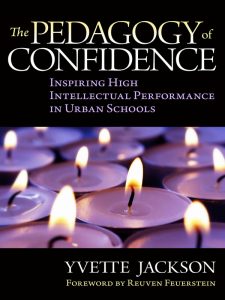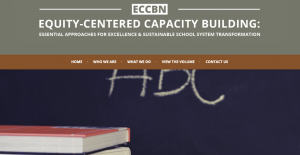“Human beings have the unique characteristic of being able to modify themselves n matter how they start out. Even inborn barriers and traumas can be overcome with belief and the right mediation.”
—Reuven Feuerstein
 Yvette Jackson shows educators how to focus on students’ strengths to inspire learning and high intellectual performance. Jackson asserts that the myth that the route to increasing achievement by focusing on weaknesses (promoted by policies such as NCLB) has blinded us to the strengths and intellectual potential of urban students–devaluing the motivation, initiative, and confidence of dedicated educators to search for and optimize this potential. “The Pedagogy of Confidence” dispels this myth and provides practical approaches to rekindle educators’ belief in their ability to inspire the vast capacity of their urban students. This book features: (1) Describes practical approaches and examples of how inspirational educators implement High Operational Practices, offering strategies for dealing with cultural disconnects, the influence of new technologies, and language preferences of students; (2) Illustrates how educators empower student investment in the “mediative learning community” to foster positive relationships; (3) Presents historical, cognitive, and neuroscience research, providing educators the rationale and benefits of changing old policies and practices to new ones that will guide students to intellectual development, self-directed learning, and self-actualization; and (4) Explores the theory and methodology of cognitive psychologist Reuven Feuerstein, upon which “The Pedagogy of Confidence” is based.
Yvette Jackson shows educators how to focus on students’ strengths to inspire learning and high intellectual performance. Jackson asserts that the myth that the route to increasing achievement by focusing on weaknesses (promoted by policies such as NCLB) has blinded us to the strengths and intellectual potential of urban students–devaluing the motivation, initiative, and confidence of dedicated educators to search for and optimize this potential. “The Pedagogy of Confidence” dispels this myth and provides practical approaches to rekindle educators’ belief in their ability to inspire the vast capacity of their urban students. This book features: (1) Describes practical approaches and examples of how inspirational educators implement High Operational Practices, offering strategies for dealing with cultural disconnects, the influence of new technologies, and language preferences of students; (2) Illustrates how educators empower student investment in the “mediative learning community” to foster positive relationships; (3) Presents historical, cognitive, and neuroscience research, providing educators the rationale and benefits of changing old policies and practices to new ones that will guide students to intellectual development, self-directed learning, and self-actualization; and (4) Explores the theory and methodology of cognitive psychologist Reuven Feuerstein, upon which “The Pedagogy of Confidence” is based.
The Pedagogy of Confidence is an approach to learning and teaching that is based on the fearless expectation that all students are capable of high intellectual performances when provided High Operational Practices™ that motivate self-directed learning and self-actualization. These High Operational Practices are:
- Identifying and activating student strengths
- Building relationships
- Eliciting high intellectual performances
- Providing enrichment
- Integrating prerequisites for academic learning
- Situating learning in the lives of students
- Amplifying student voice (Jackson, 2011, p. 71).
These seven High Operational Practices are the fulcrum around which the “gifted” education of the Pedagogy of Confidence revolves, gearing the objectives for each practice to facilitate students exploring and acting on their potential to produce the high intellectual performances that can motivate self-directed learning, self-actualization, and self-transcendence. The inherent strategies and actions used to identify and build on strengths, provide enrichment and create schema that connects to a student’s cultural frame of reference inherent in “gifted education” serve to enhance comprehension that results in strengthened competence, confidence, resilience and high intellectual performances (Jackson, 2017).
“Love is a combination of care, commitment, knowledge, responsibility, respect and trust.”
—bell hooks
Three beliefs propel these practices:
- intelligence is modifiable;
- all students benefit from a focus on high intellectual performance; and
- learning is influenced by the interaction of culture, language, and cognition) (Jackson, 2011, p. 89).
Transformational Pedagogy: Cashing The Promissory Note Of Equity For All Students – Especially Those Who Are Marginalized
“In a sense we’ve come to our nation’s capital to cash a check. When the architects of our republic wrote the magnificent words of the Constitution and the Declaration of Independence, they were signing a promissory note to which every American was to fall heir. This note was a promise that all men [and women], yes, black … as well as white … would be guaranteed the “unalienable rights” of “Life, Liberty and the pursuit of Happiness.”
—Dr. Martin Luther King Jr., March on Washington
 What makes equity so hard to achieve are its many facets, so numerous and complex they are hard to define. This inability to define equity handily is especially confounding for urban districts that reach out to our organization, the National Urban Alliance for Effective Education (NUA), for help in translating their commitment to “equity” into practices to stem the tide of unnecessary underperformance plaguing their schools. These districts are predominantly in cities where “urban” is a euphemism for “low-performing” students of color and their teachers (Jackson, 2011, p.1).
What makes equity so hard to achieve are its many facets, so numerous and complex they are hard to define. This inability to define equity handily is especially confounding for urban districts that reach out to our organization, the National Urban Alliance for Effective Education (NUA), for help in translating their commitment to “equity” into practices to stem the tide of unnecessary underperformance plaguing their schools. These districts are predominantly in cities where “urban” is a euphemism for “low-performing” students of color and their teachers (Jackson, 2011, p.1).
Martin Luther King understood the difficulty in defining complex concepts such as equity, so he employed metaphors to help people decipher and grasp the concept. In this context, equity is the promissory note he spoke about in his I Have A Dream speech: equity for all people to be free to pursue a life of happiness. In both the Declaration of Independence and the Constitution, this right to the pursuit of happiness was based on belief in the potential of Americans (at that time specifically male, land-owning Americans of European descent) to develop strengths and abilities for self-actualization. These strengths and abilities were valued for their currency … for their worth in contributing to a developing society.
